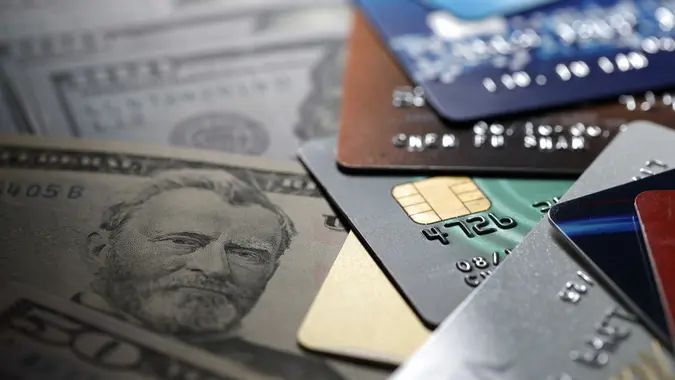Advertiser Disclosure
GOBankingRates works with many financial advertisers to showcase their products and services to our audiences. These brands compensate us to advertise their products in ads across our site. This compensation may impact how and where products appear on this site. We are not a comparison-tool and these offers do not represent all available deposit, investment, loan or credit products.
The Top Things To Consider Before Applying for a New Credit Card
 Written by
Jordan Rosenfeld
Written by
Jordan Rosenfeld
 Edited by
Lindsey Kloosterman
Edited by
Lindsey Kloosterman

Commitment to Our Readers
GOBankingRates' editorial team is committed to bringing you unbiased reviews and information. We use data-driven methodologies to evaluate financial products and services - our reviews and ratings are not influenced by advertisers. You can read more about our editorial guidelines and our products and services review methodology.

20 YearsHelping You Live Richer

Reviewed by Experts

Trusted by Millions of Readers
There are lots of reasons we take out credit cards, not the least of which is to build credit by proving that you can be timely with your payments and not carry a big credit balance. If you are thinking of opening up a new card, it’s important to be thoughtful and do your research.
The more cards you have, and the bigger your balances, the lower your credit score can go. Plus, you don’t want to open a new credit card without a goal or intention, as this is likely to lead to carrying debt and accruing unwanted interest. But there are times when you legitimately do need another card, so here are some tips for getting the best new credit card under the right circumstances.
Shop Around
You might be tempted to take the first card offer you receive, or an especially shiny new deal because of some special “offer,” but wait before you leap; make sure that there isn’t a better deal somewhere else. Credit card issuers are legally required to share their interest rates and fees on their websites, according to CNBC. This means, with a little research, you can make sure you’re really getting the right card for you.
Find Out:
Be Intentional
There are lots of reasons you might open a new credit card, but doing so “just because” is a bad idea — as carrying a balance can negatively impact your credit score, accrue interest and set you back on any future goals. According to CreditCards.com, good reasons include: to build credit, pay down debt (by transferring from a high-interest card to a low interest one), earn rewards or points and to have for emergencies. Otherwise, if you’re just opening a card because you don’t have the liquid cash to pay for something, you want to be careful that you don’t take on debt you can’t pay back quickly.
Helpful:
Seek Low Interest Rates
Every credit card comes with an interest rate that will be charged for balances you don’t pay off each billing cycle. That interest can add up very quickly over time if you are only making minimum payments. An APR is an annual percentage rate, and this can be either fixed or variable, according to CreditCards.com. Fixed rates give you a clear idea of how much you can expect to pay. Variable rates may fluctuate in relation to other financial indicators such as the economy’s index rate. Either way, interest is interest, and the lower your balance, the less of it you’ll pay.
See:
Consider Incentives
Some credit cards offer incentives in the form of cash-back rewards or points that can be redeemed for things such as airline miles and other goods and services. Seems like a no-brainer, right? Not exactly. Always read the fine print. Some companies will only issue reward-earning cards to people with a high credit score. Some cards have time limits or points caps on what you can earn. Some cards charge an annual service fee. Make sure you know exactly what you’re getting, and what the limits are. And most importantly, pay off your balance each month, or the interest you accrue may cancel out your rewards.
Be Aware:
Avoid Annual Fees
Some credit cards will charge you an annual fee just for having the card, whether you use it or not. So you’ll want to seek cards that don’t charge a fee, unless the rewards are useful and plentiful enough that they balance out the fee you’re paying. You can begin by starting with your own bank or credit card union, where, even if they do have a fee, they may waive it for existing customers.
Read:
Know the Penalties
Another way credit cards get money out of you is through penalties for such things as late payments or surpassing your card balance. Try to find a card with the lowest penalties, and then be solid in your accounting.
More From GOBankingRates
Share This Article:




You May Also Like




Experts Warn Consumers Could Pay More If 10% Credit Card Cap Limits Rewards and Raises Other Fees
January 14, 2026
4 min Read



3 Ways Trump's Credit Card Plan Could Have Major Consequences for Your Money
January 13, 2026
4 min Read

What Would Happen if Americans Stopped Using Credit Cards? ChatGPT Reveals 5 Major Economic Shifts
January 09, 2026
4 min Read




Here's Why You Should Never Use a Debit Card, According to Codie Sanchez
December 16, 2025
4 min Read




Make your money work for you
Get the latest news on investing, money, and more with our free newsletter.
By subscribing, you agree to our Terms of Use and Privacy Policy. Unsubscribe at any time.


Thanks!
You're now subscribed to our newsletter.
Check your inbox for more details.



Sending you timely financial stories that you can bank on.
Sign up for our daily newsletter for the latest financial news and trending topics.
For our full Privacy Policy, click here.
Looks like you're using an adblocker
Please disable your adblocker to enjoy the optimal web experience and access the quality content you appreciate from GOBankingRates.
- AdBlock / uBlock / Brave
- Click the ad blocker extension icon to the right of the address bar
- Disable on this site
- Refresh the page
- Firefox / Edge / DuckDuckGo
- Click on the icon to the left of the address bar
- Disable Tracking Protection
- Refresh the page
- Ghostery
- Click the blue ghost icon to the right of the address bar
- Disable Ad-Blocking, Anti-Tracking, and Never-Consent
- Refresh the page


